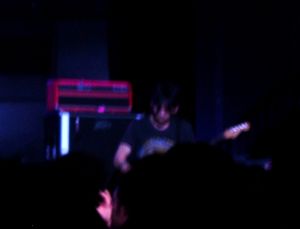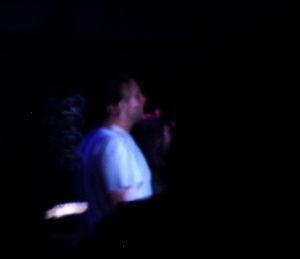the pathetic caverns - music by artist - Slint
eclectic reviews and opinions
Slint
20 Mar 2005
The Roxy (Boston, Massachusetts)
Slint was always full of contradictions.
 Thanks to the band'swillful obscurantism, there are factual errors in their album credits and band chronology in virtually every mainstream source (recent interviews in Punk Planet #66 with David Pajo and with Steve Albini and Brian Paulson -- who respectively recorded the debut Tweez and follow-up Spiderland -- set much of the record straight).
Thanks to the band'swillful obscurantism, there are factual errors in their album credits and band chronology in virtually every mainstream source (recent interviews in Punk Planet #66 with David Pajo and with Steve Albini and Brian Paulson -- who respectively recorded the debut Tweez and follow-up Spiderland -- set much of the record straight).
Slint could be crushingly heavy -- plenty of hipsters banged heads at the Boston show -- but it was usually heavy in a precise, rigid way that owed more to the angularity of Discipline-era King Crimson than to the blues riffs that underlie most heavy metal. Slint was delicate and spare nearly as often as it was sonically brutal. Like Crimson, its often profoundly artificial instrument sounds prefigured the triple-rectifier crunch of numetal, but Slint's guitar tones were sculpted on the cheap, with unfashionable equipment. It's not often you see the Peavey logo onstage at big rock shows, but it was prominently displayed on David Pajo's rig.
More than that, Slint fundamentally undermined the basic vocabulary of rock. Vocals were whispered, spoken, or screamed but almost never sung, and frequently buried deep in the mix where the ear had to strain to catch them. The bassist played chords. Instruments dropped out of songs for minutes at a time. Songs twisted through sections that couldn't easily be labeled "intro," "chorus," "verse," or "bridge," or fell into nothing just when you expected them to build. Not only did Slint avoid predictable chord progressions, but the band was more harmonically sophisticated than almost any band outside of prog rock, often using multiple instruments to voice a single chord or melodic theme. Britt Walford's drumming was revelatory -- he used the cymbals and high-hat sparingly, so his snare and tom hits often came slicing into your ears out of nearly empty space instead of the standard wall of high-end hiss.
Slint didn't follow the rock'n'roll career blueprint either. The band never toured and recorded a scant handful of material: two short albums and a posthumous two-song EP. Slint had already broken up by the time its definitive album was released. But the work transcended the rules which would have normally doomed it to obscurity. The weird record with the four dudes submerged neck-deep in unquiet water on the cover was passed from hand to hand, from dorm room to dorm room. Hey man, you gotta check this out. Eventually, in a certain hipster set, it became an album you couldn't ignore. You could claim it sucked, but you couldn't admit you'd never heard it. I think a lot of people even lied about how early they'd heard Slint, in exactly the same way some people pretended to have been into Joy Division before Ian Curtis' death.
Slint 2005 is as contradiction-filled as ever. The current tour reunites the three band members who were on all of the recordings: guitarists Brian McMahan and David Pajo, and drummer Britt Walford. Todd Cook (who played with McMahan in The For Carnation, and with Pajo in Papa M) plays bass. To allow McMahan to concentrate on his vocals, his brother Michael supplements him on guitar as necessary. It's not an all-original-members tour, but the other guys aren't ringers either. The band has been candid about the economic reasons for the tour -- to offset the costs of rehearsing for and playing the All Tomorrow's Parties festival, they simply needed to play more shows. But you can't exactly call them sellouts -- the main constraint on the Slint tour is McMahan's commitment to his day job. They've been playing Clear Channel venues -- to the biggest audiences most of these guys have had in their careers (although Pajo did time with Billy Corgan's Zwan) -- but they're still flouting most of the usual rules.
The kind of band that plays halls with capacities of a thousand rarely stops mid-set and just does nothing -- the momentum of the set is prized, and even instrument swaps are usually handled speedily and with the aid of dedicated instrument techs. If tuning breaks are necessary, they're usually covered by scripted patter. Slint stopped between every song. Often for more than a minute. Were they tuning? Or just building the dramatic tension? It was way too dark to tell. Pauses early in the set were punctuated by audience yells of "Thank you, good night!" and I'm sure I'm not the only one who thought of the legendary 15 minute sets of the first Jesus and Mary Chain tour. I've never once seen a band pace a set like Slint did. I found myself digesting the experience while I was still having it -- I had time to evaluate the progress of the show, and my response to it. Are my expectations being met? (Yes.) Can I find any flaws with some aspect of the show? (Not really.) By the time the set ended, I felt like reviewing it was more a matter of typing up the thoughts I'd already had than having new thoughts about it.
 There was no encore, and virtually no acknowledgement of the audience. McMahan was the only one who spoke, which he did twice. The first time he asked, "Are we as good as the Slint tribute band?", which made me think about just how insanely hard it would be to put together a Slint tribute. It's a ludicrous notion. The second time he mumbled a reference to Big Bird, which caused a ripple of perplexity to run through the crowd. "What'd he say?" "I dunno, something about Muppets." The flippancy of his remarks ran directly counter to the intensity of the performance, but in true Slint form, it didn't break the mood. We laughed, but we laughed awkwardly.
There was no encore, and virtually no acknowledgement of the audience. McMahan was the only one who spoke, which he did twice. The first time he asked, "Are we as good as the Slint tribute band?", which made me think about just how insanely hard it would be to put together a Slint tribute. It's a ludicrous notion. The second time he mumbled a reference to Big Bird, which caused a ripple of perplexity to run through the crowd. "What'd he say?" "I dunno, something about Muppets." The flippancy of his remarks ran directly counter to the intensity of the performance, but in true Slint form, it didn't break the mood. We laughed, but we laughed awkwardly.
The effects on Brian McMahan's vocals throughout the night closely mimicked the sound of Tweez: lots of reverb and harsh EQ that emphasized sibilants. It went a long way toward hiding any of the defects that might have been evident from a performer who left the music industry nearly ten years ago, but it sapped some of the delicacy and almost disturbing intimacy that was the hallmark of the recorded versions of "Washer" and "Good Morning, Captain."
Other than that, the sound and performance were damned-near flawless. There's plenty of discussion about the reunion tour on 'net chat boards, and the most frequent criticism is that the band's lack of interaction with the audience indicates their own lack of involvement with the performance. I don't buy it for a second. The material is too challenging for me to believe musicians could pull it off if their hearts weren't in it. If Pajo and Cook seemed a little stiff, Walford thrashed around enough for the whole band. Their failure to execute clichés like, "How ya feelin', Boston?" is just another aspect of their subversion of the expectations of rock. If the music itself wasn't clear and unambiguous communication with the audience, I don't know what could be. As good as Spiderland is, the recording can't capture the almost symphonic blend of guitar and bass tones in live performance. The sound was so rich and wide-spectrum that it sometimes evoked a massive church organ. Walford's drums were more apocalyptic than ever, with even more exaggerated dynamics than on the albums. The climax of "Rhoda" plunged the audience into a war zone -- the bass and drums rumbled, cracked, and boomed like rifle and artillery fire, the guitars screamed air-raid feedback, and the lights flared painfully bright like explosions overhead.
The set included the entirety of Spiderland and the untitled EP, half of Tweez, and one previously unreleased song, "Pam." The overtly King Crimson-y "Pat" from Tweez was the weakest selection. It's a guitar showcase for Pajo, but its funky bassline and hammer-on and pull-off moves sound a bit standard, even naîve, compared with the rest of the catalog. The tour performances weren't note-for-note reproductions of the recorded versions, but they weren't far off, either. They're pretty much what you might have expected Slint to sound like if they'd toured a year or two after Spiderland -- the songs grown up or out a little bit, but their cores very much intact.
This review originally appeared at Avoid Peril.
unauthorized reproduction prohibited.
all contents © 1995-2026 d. mayo-wells except where otherwise noted.



